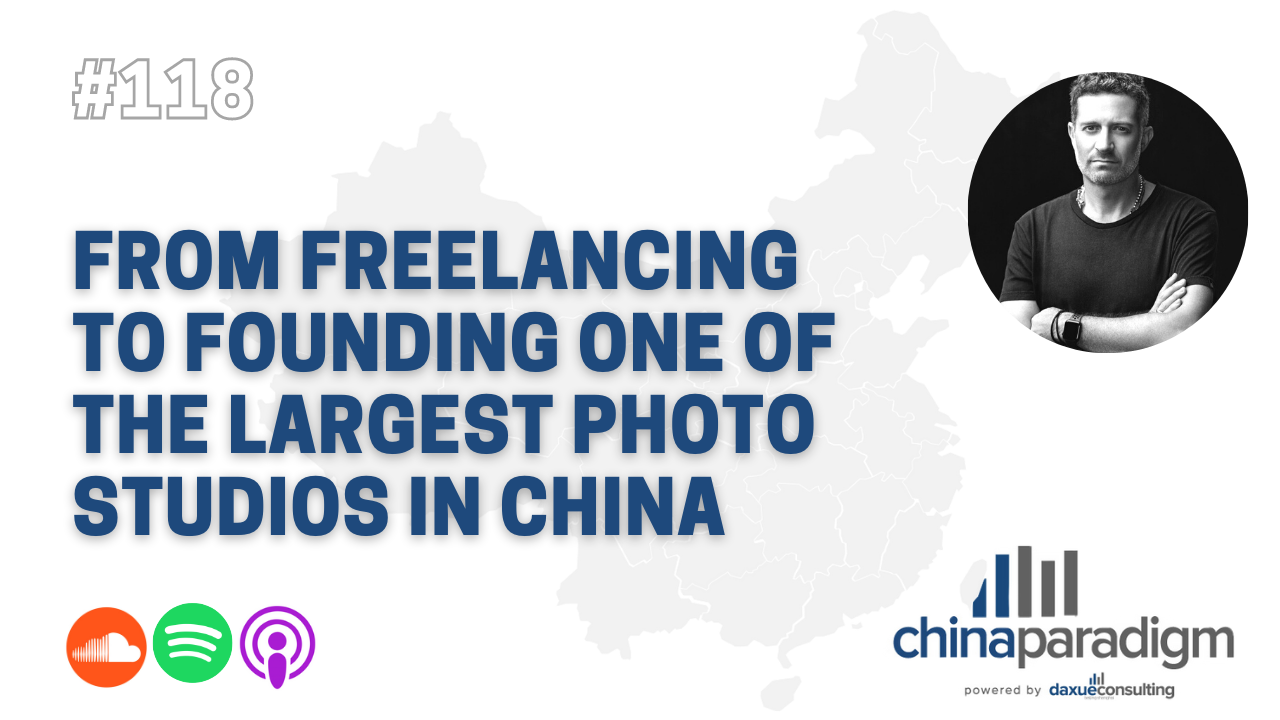Today’s episode features Rodney Evans. He is the founder and CEO of Central Studios Shanghai. Rodney has been in China since 2005. He founded his Shanghai content production studio in 2009. They mostly cover production and post-production in photography and video, used as marketing content for brands in China. Central Studios Shanghai has a 1,000 sq.m studio with 3 studio/shooting rooms, VIP rooms, etc. They’ve produced marketing content for brands in China such as Nike, GAP, Coca-Cola, Old Navy, Elle, Apple, and Yves Saint-Laurent. They have a team of about 30 people.
Listen to the full China Paradigm episode 118 on Youtube, Apple Podcast, Spotify, Soundcloud, or Ximalaya.
Can you give us a brief history of your company’s journey in China?
Rodney Evans: Thanks for having me. I initially came to China as a photographer because I wanted a change of scene from Australia. There was massive room to grow as a commercial photographer as the market was so underdeveloped back then. We were the first international-level Shanghai content production studio. We received widespread acclaim across China relatively quickly back then.
But over the last 10 years, the industry has gone from strength to strength. The rise in professionalism, the increase in the quality of the local photographers, technicians, the crew, the creativity. The adoption of new technologies have been breathtaking. It is at a world-class level now. Having a studio for the last 11 years, I’ve borne witness to this metamorphosis. I guess we just caught a wave and have been riding it ever since. As the industry has grown, social media has increased the demand for marketing content for brands in China, albeit cheaper content. Still, all brands that advertise on social media need content. It’s about being flexible enough to catch new work when it comes.
You mentioned international studio, what makes a content production studio international?
Rodney Evans: When I first came here, I remember these big warehouses everywhere. But when you would go to a studio to shoot, you would never find all of the equipment you need, and you would have to go to the studio, find out what equipment was needed, go out and procure the equipment and bring it back to shoot another day. So, when we built our Shanghai content production studio, we had the chance to take a lovely place in the heart of the city.
We made sure it had all the equipment that a crew would need, and at that time, it was really a blue ocean market. But pretty quickly, people saw what we were doing and started to imitate us and our business practices. But I took that as a form of flattery. So, by international, I mean that we provided a full service, one-stop solution. But now, apart from studio and equipment rental, we also offer lots of other services.
How did you manage to get such a good location in Shanghai?
Rodney Evans: So firstly, as with most successful businesses in China, you need a bit of good luck and to avoid any bad luck. Before buying it, I had worked in that place and had planned to set up a Shanghai content production studio in 2008 in a different location. The financial crisis happened, so we postponed that idea. But one day, while working in our current studio, I talked with the landlord and agreed to rent it from him.
At that time, there were no metro stops nearby. Now there are 3. There were none of the cafes and restaurants you see now, only old houses and now there is the big mall where previously there were demolished old houses. The rent has gone up a lot, but we have a good relationship with the landlord, and we bring a lot of celebrities to our Shanghai content production studio, and when he comes around and brings his boss, he can show them all the celebrities on our wall.
What are the specific services that Central Studios Shanghai offers its clients?
Rodney Evans: 80% of our business comes from production-related services instead of studio/ equipment rental. So, clients need us to create image or video marketing content for brands in China. Sometimes it will be direct with the brand and sometimes through an agency.
How has the revolution in the internet changed the demand for marketing content for brands in China?
Rodney Evans: Totally, at first, we did shoots, and these were released in clearly defined channels such as OOH (out of home), in-store, online, magazine print, posters, etc. Nowadays, it’s majority digital with a little in-store and outdoor. Back then, clients would pay less for digital because the lower level of technology, i.e., internet speeds, device resolutions, mobile phone usage, etc., meant you couldn’t reach as many people. And now, they’ve gotten used to those low prices, although digital reaches far more people than any other medium.
The internet has impacted our pricing a lot, too. These days clients come to us and need different marketing campaigns, but their marketing budget isn’t any bigger. It needs to split across many different campaigns, and our profit margins have come in a fair bit. There are fewer and fewer big brand campaigns and more of a move towards brands becoming tactical. And the shopping calendar is being driven by Tmall and their sales holidays. So, instead of big overall brand campaigns, brands focus on the Tmall sales events such as 11.11, Valentines Day, Chinese New Year, 6.18, etc. So, the way these brands create brand loyalty has also had to change.
How has COVID-19 impacted the media production industry?
Rodney Evans: For the first 2 months, our Shanghai content production studio had to go into lockdown mode and cut all costs. But in around April, clients started to trickle back looking for us to do work for them. And now, despite marketing budgets being down in those companies, we are slightly up on last year, probably because domestic brands are finding it harder to do campaigns outside of China and overseas clients who can’t bring their teams over and need us to do so stuff for them. Also, the domestic economy is quite strong.
Could you share with us some company metrics from 2019? How is your team organized? What are the main departments?
Rodney Evans: Our Shanghai content production studio has about 30 staff. In 2019 we restructured a lot. We keep a lot more marketing content for brands in China jobs in-house, saving about 25% of our margin, which goes toward our bottom line.
We used to have 2 main departments, one being the photo department who take care of clients who come to use our studio or equipment. I liken them a little to our retail in that there is more traffic, but we make only 20% of our money through it. The other main department is the production department. They make the marketing content for brands in China and deal with building relationships with clients and recurring customers. But since early 2019, there has been the post-production department which has recently become its own profit generator. Then there’s also the admin, of course. In terms of structure, we have regular meetings with the heads of each department.
What’s it like managing artists?
Rodney Evans: Well, we have one or 2 junior photographers who are always in the Shanghai content production studio. However, after looking at a client’s brief, we usually recommend an outside artist for the job, be they video producers or photographers. When working with celebrities, we often don’t have a say in who the artists will be because they will already have their preferred artist. In those cases, it’s just about making sure they have all the equipment they need. But when our suggestions for particular artists are taken on board, we try to balance respecting the artist with delivering for the client and keeping the project within budget.
Do you almost feel like an agent for those artists?
Rodney Evans: Well, we’ve thought about doing that before, but in China, the concept of loyalty doesn’t really exist in that sense. The market seems hardwired to cut out the middle man, so we generally don’t get too attached to any particular artists.
There are some very famous photographers in the West such as Richard Avedon, Yann Arthus-Bertrand, and Henri Cartier- Bresson. Are there similar photography stars in China? Any potential stars to look out for?
Rodney Evans: Yes, definitely. Probably the most well-known would be Chen Man, a Beijinger. She was one of our first clients. A lot of other photographers have massive amounts of followers, in part due to them photographing celebrities. Interestingly, the people at the top over here don’t really seem interested in working overseas. The massive volume of work here, plus their adherence to the unique Chinese style/ aesthetic, means most are fully occupied with shooting here.
So, there aren’t really many worldwide famous Chinese photographers?
Rodney Evans: No, apart from Chen Man, who recently has moved a little away from photography and tried to branch into directing. Also, because they are so busy, Chinese photographers have less time to pursue their own projects and come up with their own unique style to emulate the other top Chinese photographers. A lot of interesting stuff coming out of the younger photographers.
I’d like to understand a little bit about how the market for marketing content for brands in China is structured.
Rodney Evans: Market structure is driven by production companies who try to keep as much as possible in-house. Sometimes brands will go directly to KOLs, influencers, and photographers who will also have their own particular style or team. Every player is trying to grab as much of the market as possible and how you navigate that.
What internet trends are likely to affect the content production industry in China?
Rodney Evans: Probably computer-generated images and virtual celebrities, where celebrities won’t have to travel to a location anymore and live stream a virtual location. So, a move away from the traditional model towards the virtual level, I think China is at the forefront.
How will you be ready for that? For the smaller part of your business that involves renting space/ equipment.
Rodney Evans: Well, I think it’s actually pretty resilient in that regard. Marketing content for brands in China and shooting people on green screens will always be in demand, even if the model’s environment is virtual. My biggest worry about the rental part of our business is that I may lose out on opportunities because I don’t concentrate on them.
What books, movies, etc. have inspired you?
Rodney Evans: Over the years, I’ve had to read many management books that have been shared through Entrepreneurs Organization (EO). In EO, they recommend a system of scaling up which follows Gazelles’ Management System. But as a result of reading so many management books, I wanted to read some excellent fiction. So, a great book I’ve read recently has been The Overstory by Richard Powers. It talks a lot about the destruction of the environment and how intelligent, and dependent natural systems are on each other.
You live in shanghai which is a very urban and very busy city, what in particular resonated with you in this story?
Rodney Evans: It’s also kind of a metaphor of not just how people depend on nature but how people depend on people. And against the current backdrop of society, we face these issues highlighted in the book about how we poorly treat the environment and each other.
Having a son now and thinking more about the future, the environment is quite important to me. We’ve made some changes around the office and implemented some initiatives to try and do our bit. I’ve been happy to see more general awareness, and lots of changes and policies have been made and brought in in China. I think there’s a chance for China to really lead the world on this issue.
How do you stay up to date with news in China?
Rodney Evans: I follow a few industry blogs which keep me up to date, and also some WeChat accounts such as RADII China, also I like the Sinica Podcast
What books on China would you recommend for people who want to understand more about China?
Rodney Evans: I read a great book a few years ago by Mario Cavolo called China: The Big Lie, which gave some incredible insights into the cash economy in China. Another book I read recently read was called Feeding the Dragon by Chris Fenton. It gave an insight into the use of soft power by China.
You’re from Australia. How is the relationship between Australia and China these days?
Rodney Evans: It’s a little disappointing, but hopefully, it will blow over.
How about productivity tools? How do you organize your digital life?
Rodney Evans: I turn my WeChat notifications off, so I won’t notice anything unless I look at my phone, same with email. Generally, I turn all digital notifications off apart from my morning alarm.
In terms of productivity or project management tools, we’ve tried a few, but if everybody doesn’t buy-in, then it kind of falls apart, which has happened to us a few times.
I use Evernote to keep all my notes, but I prefer to use Apple Notes more and more.
If you had more time, what would you do?
Rodney Evans: If I had more time, I’d love to be more supportive of my wife’s endeavors. She’s creative and always has great ideas, which id love to collaborate more on.
An unexpected surprise in China?
Rodney Evans: Deserts in Inner Mongolia, resorts in the middle of deserts. Once, back when I was a photographer, I was hiking up a mountain in Sichuan to catch the sunset. We got to the place we had wanted to shoot from. The moment the sun broke through the clouds, instead of silence and awe, we heard this massive cheer from a mountain nearby, which unbeknownst to us had a hotel on top of it and hundreds of people had come out to watch the sunrise, so the thing is that because of the scale of the country there are always huge amounts of people everywhere.
What unexpected success/ failure have you seen in China? In society or business.
Rodney Evans: An unexpected success was the fair day we started back in 2010 where everybody would come down and sell their second-hand stuff, and now it attracts a few thousand people.
A failure would be the global political situation. Hopefully, for the sake of international cooperation, there will be a return to normalcy in political relations. That’s coming from both a business perspective and from a personal perspective.
Listen to the full China Paradigm episode 118 on Youtube, Apple Podcast, Spotify, Soundcloud, or Ximalaya.





